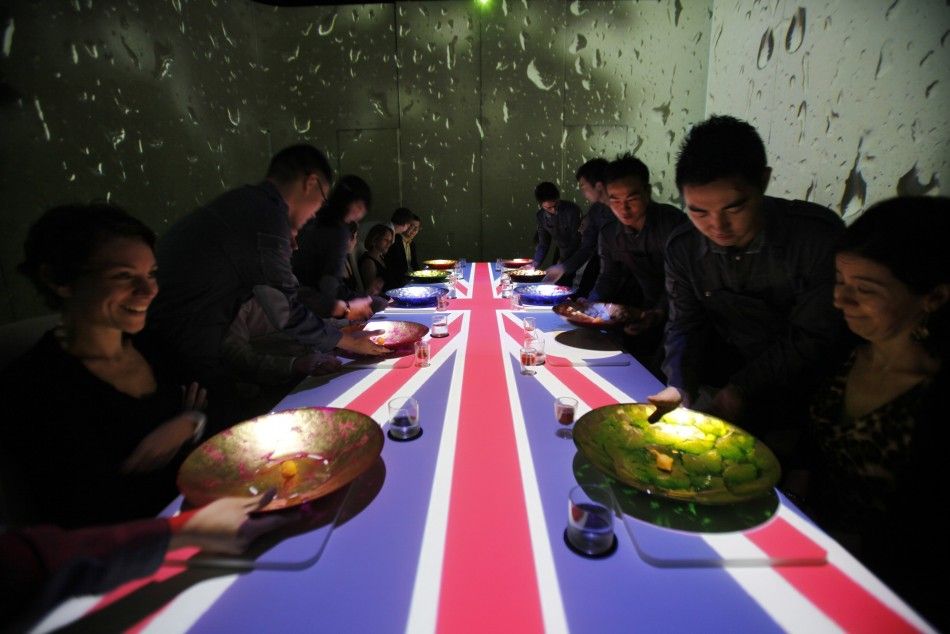Ultraviolet Restaurant: Shanghai Eatery Pairs Food, Wine, Light, Sound
(Reuters) - Dinner at the Shanghai restaurant Ultraviolet starts at 7:30 p.m., after the guests have been driven to the windowless venue from another meeting spot by two vans.
Once they're seated, giant projections of red brick walls appear and start to shift upwards quickly, creating the illusion that the entire room is sinking. This is followed by the sound of cracking stone, a starry sky, lit purple candles, and the ringing of a church bell.
Only then do waiters appear to serve the appetizer: a frozen wasabi-flavoured apple juice ball.
Housed in a former warehouse in central Shanghai, the restaurant, the brainchild of French-born Paul Pairet, serves a 22-course banquet that aims to stimulate all five senses to just ten guests a night.
I want a single table that I can master. Once you control every element, from time, food to atmosphere, you make your own opera, said Pairet, who runs another high-ranked eatery in China's commercial hub. Food is the lead.
Each course is served with a tailored set of visuals, sound and smell. Guests enjoy steamed lobsters as images of crashing waves are projected onto the walls, the refreshing smell of ocean sprayed from the diffusers and the sound of waves played through the speakers.
The restaurant, which opened in May, is a long-term dream for Pairet, who at the age of 18 decided to make a business out of one or the other of his hobbies, photography or cooking.
The former science student was fascinated by what he saw in his first cooking class in the southwestern city of Toulouse. A teacher showed them three glasses of water, each with sliced or whole carrots inside - and began to explain the phenomenon of diffusion and other biochemical reactions with cooking.
That was very impressive, especially to people with scientific background, said Pairet, sipping an espresso. To cook, I need to understand what I am doing.
After graduating, Pairet first drew attention at Cafe Mosaic in Paris. Over ten years, he travelled to Hong Kong, Sydney, and Istanbul, finally settling in Shanghai in 2005 to open Jade on 36, a restaurant in the Shangri-La hotel.
There, guests order from four sets of menus, each of three different sizes, depending on how hungry they are.
Pairet soon found guests had difficulty making orders and particularly in pairing dishes with wine. He felt it would be good to use a table d'hôte, the serving tradition where the host decides the menu and guests all eat the same thing.
Forget about choosing (the food), he said. We pair food together with drinks, either wine or non-alcoholic beverages. To maintain a balance of all 22 dishes... all the drinks need to be balanced too.
PSYCHO TASTE
In late 2009, he spent 6 months looking for a place to launch his dream restaurant, then laid out $2.5 million to renovate the space.
He paired each course with a beverage - mostly wine, sometimes sherry, beer and Chinese tea - and a scenario which he boasted could stimulate the customer's psycho-taste.
Then we work on the settings. It can be as simple as the light or a combination of image projections and scents, he said.
The current meal follows the lobster with truffle-topped bread accompanied by scenery of a forest and a scent called Autumn Soil. The main course of sea bass is served with the images of colourful tropical fish swimming around the room.
The experience does not come cheaply at 2,000 yuan a guest, but most seatings are booked through the end of September - something Pairet attributes partly to Shanghai's willingness to accept new ideas.
Does the multi-sensory experience really add to the food?
Do you want to read the book of comments (from guests)? Pairet said. If I tell you everything they have told me, I would appear pretentious. (Reporting By Shanghai Newsroom, editing by Elaine Lies)







© Copyright Thomson Reuters 2024. All rights reserved.












